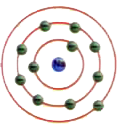If an isotope of hydrogen has two neutrons in its atom, its atomic number and mass number will respectively be
2and 1
1 and 1
3 and 1
1 and 3
The correct Answer is:D
To solve the problem of determining the atomic number and mass number of an isotope of hydrogen that has two neutrons, we can follow these steps:
Step 1: Understand the Basics of Atomic Structure
- The atomic number (Z) of an element is defined as the number of protons in its nucleus.
- The mass number (A) is the total number of protons and neutrons in the nucleus.
Step 2: Identify the Isotope of Hydrogen
- Hydrogen has three isotopes:
1. Protium (¹H) - 1 proton, 0 neutrons (mass number = 1)
2. Deuterium (²H) - 1 proton, 1 neutron (mass number = 2)
3. Tritium (³H) - 1 proton, 2 neutrons (mass number = 3)
Given that the question specifies an isotope of hydrogen with two neutrons, we are dealing with Tritium.
Step 3: Determine the Atomic Number
- Since all isotopes of hydrogen have the same atomic number, which is 1 (because they all contain one proton), the atomic number of this isotope is:
Atomic Number (Z)=1
Step 4: Calculate the Mass Number
- The mass number is calculated using the formula:
Mass Number (A)=Number of Protons+Number of Neutrons
- For Tritium, we have:
- Number of Protons = 1
- Number of Neutrons = 2
- Therefore, the mass number is:
Mass Number (A)=1+2=3
Conclusion
- The atomic number of the isotope of hydrogen with two neutrons is 1, and the mass number is 3.
Final Answer
- Atomic Number: 1
- Mass Number: 3
---
- The atomic number (Z) of an element is defined as the number of protons in its nucleus.
- The mass number (A) is the total number of protons and neutrons in the nucleus.
- Hydrogen has three isotopes:
1. Protium (¹H) - 1 proton, 0 neutrons (mass number = 1)
2. Deuterium (²H) - 1 proton, 1 neutron (mass number = 2)
3. Tritium (³H) - 1 proton, 2 neutrons (mass number = 3)
- Since all isotopes of hydrogen have the same atomic number, which is 1 (because they all contain one proton), the atomic number of this isotope is:
Atomic Number (Z)=1
- The mass number is calculated using the formula:
Mass Number (A)=Number of Protons+Number of Neutrons
- For Tritium, we have:
- Number of Protons = 1
- Number of Neutrons = 2
- Therefore, the mass number is:
Mass Number (A)=1+2=3
- The atomic number of the isotope of hydrogen with two neutrons is 1, and the mass number is 3.
- Atomic Number: 1
- Mass Number: 3
Similar Questions
Knowledge Check
If the mass number of an element is W and its atomic number is N, then
Anumber of 0−1e=W−NBnumber of 11H=W−NCnumber of 10e=W−NDnumber of 10n=N
Define atomic number and mass number of an atom.
View SolutionAn isotope of atomic mass 25 has 13 neutrons in its neucleus .What is its atomic number and what are the name and chemicalsymbol of the element ?
View SolutionThe atom of an element is made up of 4 protons, 5 neutrons and 4 electrons. What are its atomic number and mass number?
View SolutionA nucleus of stable phosphorus has 15 protons and 16 neutrons.
(a) What is its atomic number and mass number ?
(b) The nucleus of radio phosphorus has one neutron more than the stable nucleus. What will be its atomic and mass number ?
(c ) What will be the atomic number and mass number of new nucleus formed by the decay of a β-particle by the radio phosporus in part (b) ?
View SolutionHow many electrons, protons, and neutrons are there in an atom of atomic number 11 and mass number 24?
View SolutionAn element A has 2 electrons in its, fourth shell. State its atomic number
View SolutionA neutral atom possesses 92 protons and 146 neutrons. Find its atomic number, mass under and number of electrons present in it.
View Solution

